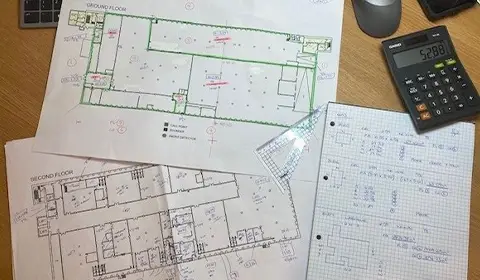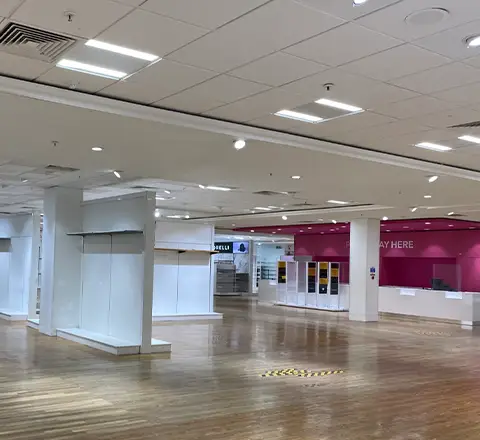BREEAM
Best practice in sustainable building design, construction and operation Discuss your projectBREEAM Certification |
BREEAM Certification
BREEAM is a globally recognised standard for showing best practice in sustainable building design, construction and operation.
In the UK more and more projects are using BREEAM certification to benchmark new and existing property assets across a all types of buildings. Research by JLL has shown rental premiums of 11.6% with capital values boosted by 20.6% for properties in London with BREEAM certification.

BREEAM certification offers numerous benefits for project developers, building owners, occupants, and the environment:
- Reduced environmental impact
- Lower operating costs
- Enhanced occupant health and well-being
- Improved marketability and reputation
- Support for corporate social responsibility goals

What is a BREEAM Assessment?
BREEAM certification was developed by the Building Research Establishment (BRE) and uses a number of categories to measure and evaluate the environment impact by assessing its performance across the following categories:
- Health and Wellbeing – Daylight Calculations, Thermal Modelling, Acoustics
- Energy – SBEM, SAP, Air Tightness, Feasibility Study, LZC Report
- Water – Water Efficiency Calculations
- Materials – Materials used within construction
- Waste – Reducing waste during construction and operation
- Land Use and Ecology – Contaminated Land
- Pollution – Flood Risk Assessments, Noise Impact Assessments
- Transport – Access to public transport, car parking, etc
- Management – Thermography
What is a BREEAM Rating?
Credits are awarded based on what environmental measures are being used in each category, these are then added together and weighted according to their environmental significance to give the final rating. The table below shows the percentage scores required for each BREEAM rating.
BREEAM certification process encourages developers, designers, and building owners to consider sustainability from the earliest stages of the design process, leading to the construction and operation of buildings that contribute positively to their environment.

Is BREEAM Mandatory?
Although not mandatory in the UK, BREEAM certification is it is often required by local planning authorities for certain types of developments, especially for large commercial or public buildings.
Certain stakeholders may require BREEAM certification as a condition of their involvement in a project or want to advertise the projects green credentials. For example, the UK’s central government has required BREEAM certification for its own buildings and for those where it contributes significant funding.
How Do I Get BREEAM Certification?
BREEAM assessments can be applied to the following schemes:
- New Construction
- Refurbishment and Fit Out
- In Use for Existing Buildings
The BREEAM assessment consists of a structured process and starts at the beginning of a new project. It normally follows the following stages:
- Pre-Assessment
- Design Stage
- Post construction
- Certification
- With an optional Post Occupancy stage.
Your assessor will gather evidence from your team at each stage and compile this into a report to send to BRE, who will provide the final certification.

How Long Does BREEAM Certification Last?
Generally, BREEAM certification is valid for five years from the assessment date. After this time, the building must be re-assessed to maintain its certification.
The frequency of re-assessment for BREEAM certification depends on the specific assessment scheme and rating level that your building has achieved.
Some BREEAM assessment schemes, such as BREEAM In-Use for existing buildings, require annual re-assessment to maintain certification. Other schemes, such as BREEAM New Construction for new builds, do not require re-assessment unless significant changes are made to the building.

Why Use BREEAM?
The benefits of BREEAM certification are numerous, including improved energy efficiency, enhanced marketability and value, and a demonstration of the building’s environmental performance to stakeholders and investors.
JLL research from 2023 showed that London properties with BREEAM certification boosted capital values by an average of 20.6% with rents up receiving an 11.6% uplift.
Frequently Asked Questions About BREEAM and BREEAM Certification
How much does BREEAM Certification cost?
The cost of a BREEAM Assessment is bespoke to each project and is also dependent on the required BREEAM Rating that is required. A BREEAM Assessment from Pre-assessment stage to post-construction stage can range from £10,000 – £50,000 + VAT.
How much does a BREEAM Pre-assessment cost?
A BREEAM Pre-assessment will cost around £2,000+VAT depending on site factors and BREEAM certification requirements.
How long does a BREEAM Assessment take?
The BREEAM assessment process will run across the whole project duration. The BREEAM is split into stages across the project but the BREEAM Assessor will have involvement in the process throughout. This is to ensure that the relevant credits and information is collected at each stage.
How long does a BREEAM Pre-assessment take?
A BREEAM Pre-assessment will take approximately 1-2 weeks to complete. This will alter depending on the availability of the project team and project complexity.
Who regulates BREEAM?
BREEAM is regulated by the BRE Group, all certification, training and quality control is managed by BRE https://www.bregroup.com/.
